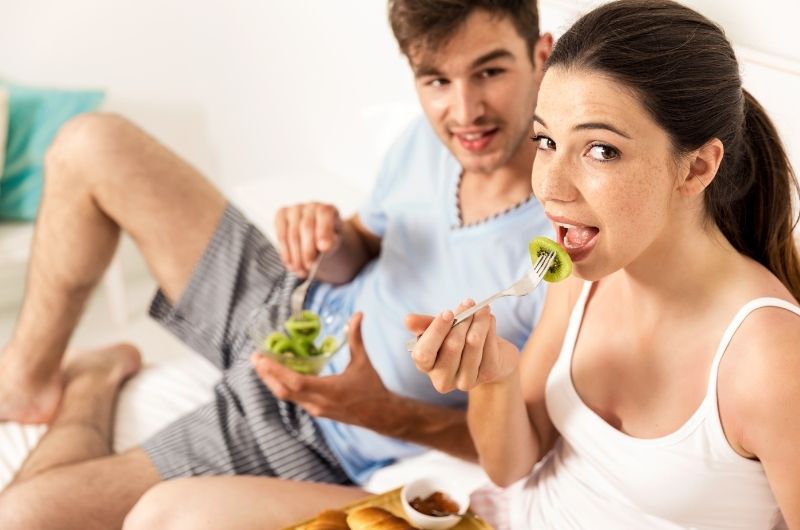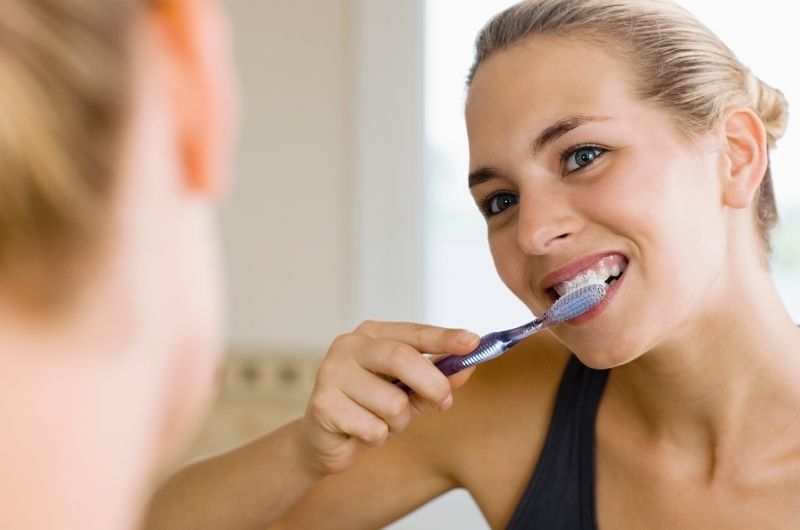Eating right after brushing your teeth can weaken your enamel, thus causing sensitivity and further problems in the future. Similarly, drinks like orange juice rich in vitamin C, though very beneficial for the body, are not good for your teeth if you have brushed them recently. This is because the citric acid in it targets your gums and teeth and causes severe irritation. Therefore, it is advised to wait at least 30 minutes before your meal after brushing your teeth and vice versa.
Since childhood, you’ve been hearing that brushing your teeth is the best way to protect them, rightly so.
Brushing your teeth is the single most effective way of cleaning your teeth to avoid tooth diseases like tooth decay or bad breath but is it always beneficial, or does it have any cost?
You just woke up and brushed your teeth, but wait, you’re also craving a glass of orange juice alongside your breakfast, you regardless, have a sip of the juice, but now you feel sensitivity.
Is it harmless? Is it okay to eat right after you have brushed your teeth? This article will comprehensively cover all of the confusion related to brushing your teeth.
Key to cleaning your teeth
A sticky white substance containing harmful bacteria covers your teeth; brushing your teeth helps to clean them.
According to the American Dental Association, it is advised that you should brush your teeth twice daily with fluoride toothpaste.
Fluoride is essential for people who already have cavity-prone teeth as it forms a firm layer around your teeth and protects against bacteria and germs that come with the food you eat.
Healthier and stronger teeth need to brush your teeth for 2 minutes with a stiff bristle toothbrush. To be safe, you should plan when to brush your teeth.
Note: Brushing more than 3-4 times a day can actually damage your teeth due to the friction caused by the toothbrush. It is advised to rinse your teeth with water after brushing.
Should you brush your teeth before or after having your breakfast?

Previous studies have shown that it was better to brush your teeth after eating your breakfast; however, according to the more recent studies brushing your teeth after eating your breakfast may be harmful as the acidic food along with the fluoride in the toothpaste covers your teeth, which causes the enamel in your tooth to weather off resulting in tooth damage slowly.
A plaque containing bacteria in your mouth multiplies overnight, which is the reason behind mossy breath in the morning; brushing your teeth removes all the plaque, and fluoride in the toothpaste forms a layer around your teeth to protect against the incoming acid in your breakfast.
Brushing your teeth also speeds up the process of releasing saliva from the salivary glands.
The saliva helps you break down your food, which prevents it from getting stuck in your teeth. Moreover, the saliva also kills harmful bacteria in the food, which prevents tooth decay.
You can have all types of food before or after brushing your teeth as long as you have a healthy diet, follow the correct principles of cleaning your teeth, and importantly keep in mind the ideal 30 minutes gap between eating and brushing.
The correct order of cleaning your teeth

Follow these guidelines for a perfect and healthy smile.
Remember, don’t rinse your mouth immediately after brushing your teeth; wait around 40 to 50 seconds for the fluoride to settle in.
Alongside brushing, using a mouthwash containing fluoride can be very helpful. However, using it right after brushing may not be as good, as it can wash away all the fluoride concentration on your teeth.
In addition to this, you should floss regularly to remove the food particles stuck in your mouth.
The next obvious question that comes to your mind is, what is the best order of cleaning your teeth?
Honestly, it doesn’t matter; but it is generally better to use floss first and then start using mouthwash. This way, you can maximize the fluoride concentration in your mouth by not immediately washing it away with the mouthwash.
However, what’s essential is that you should always plan your cleaning activities. Excess of everything is terrible, and so is excessive usage of mouthwash.
Mouthwash doesn’t discriminate among bacteria and, in turn, kills them all, which is not necessarily good as certain types of bacteria are essential for healthy teeth. This also disrupts your body’s own capability to fight germs that cause cavities and gingivitis.
Moreover, alcohol-containing mouthwash though kills bacteria but also makes your mouth dry, which again is counterproductive. You always need to consult with your dentist about which mouthwash to be used.
Some studies have revealed that more than two times, usage of mouthwash daily results in tooth staining, taste disturbance, and you can have a sensation of dry mouth in some cases.
For ages, it has been recommended to use Listerine as your mouthwash; however, the same is the case with this as well, and it can be bad for you as well, as excessive usage has caused mouth sores ethanol in it has caused excessive burning.
Food to avoid for better & healthier teeth
- As already mentioned, Citrus food is straight away no, as the acids in it are a complete disaster for your teeth. To complete your balanced diet, you should take this in moderation and rinse your mouth with water immediately.
- All food containing sugar, as it invites cavities. I wasn’t allowed to have candies and chocolates all of my childhood, and I used to hate it, but now I realize how devastating it is, especially for your teeth, as it is the most common reason for cavities.
- Alcohol: it makes your mouth dry, reducing the amount of saliva produced in your mouth. Saliva is crucial for good teeth as it prevents food from sticking in your teeth and also cures early signs of tooth decay (remember to drink loads of water for a moist mouth)
- Bread, Potato chips, and cereal products all of these products contain starch, and as starch is sugar, it is again not good for your teeth (starch is broken down to sugars in your mouth)
- Carbonated drinks, every soda drink is full of sugar and carbon dioxide, cause tooth decay and severe sensitivity.
- Dried fruits, if you are a fan of munching on dry fruits in cold weather, it is not so good news because dried fruits are sticky and can get stuck in your teeth, eventually cause teeth problems.
- Fruits containing sugar like Bananas, apples, watermelons. These fruits can cause teeth problems; however, the nutrients in them are also beneficial, so as long as your brush your teeth after eating them, it’s all good.
- coffee, like any other drink other than water, can cause bacteria to grow in your mouth, which eventually damages the tooth enamel and cause your teeth to be thin and brittle (considering every other person drink coffee or tea in this era, it’s difficult to avoid, have your morning coffee before cleaning your teeth, and make sure that you clean your teeth with a fluoride toothpaste or a mouthwash)
Note: Remember to brush after having every meal. It is essential not to have these food items once you are done brushing your teeth as the acid or sugar in the food will stick in your teeth and causes future teeth problems.
Foods to eat for better teeth
- Food that is low in sugar and high in calcium, such as cheese, milk, and yogurt. Cheese contains casein, which is a protein and is highly efficient in strengthening your enamel. Milk lowers acidic levels in your mouth. Yogurt’s probiotics protect you against gum diseases and bad breath.
- Vegetables that contain water and are crunchy. For example, carrots and celery. These vegetables involve chewing, which cleans the surface of your teeth. The water helps to moist your mouth for more production of saliva. Celery is actually the only natural thing closest to dental floss, as it is full of minerals and vitamins, and its crunchy nature helps you clean your teeth.
- Fresh nuts contain essential elements for teeth, such as calcium and phosphorus. It is highly recommended to eat nuts such as Brazil nuts and cashews. Other nuts such as walnut and peanuts, are rich in vitamin D as well moreover it contains fiber, iron, thiamine, potassium, and zinc, which are essential to avoid tooth decay.
What have we learned so far about teeth health?
- The ideal time difference between eating and cleaning your teeth is 30 minutes.
- It would be best if you planned your teeth cleaning routine.
- All types of sugars should be avoided.
- Excessive usage of toothbrush or mouthwash results in tooth damage and other diseases.
- The correct order of cleaning your teeth.


